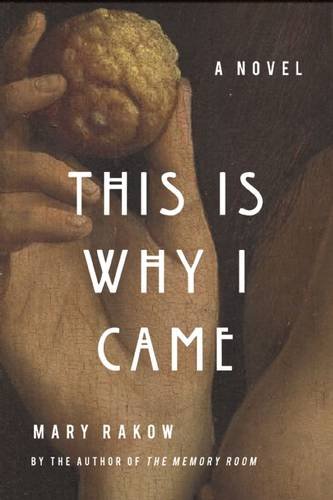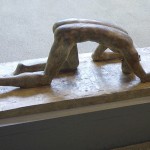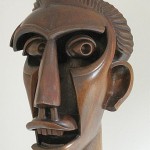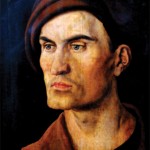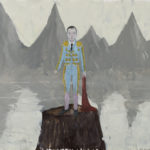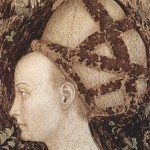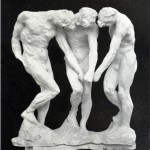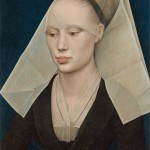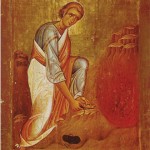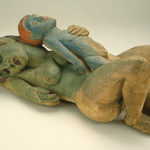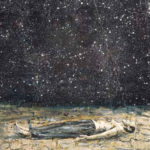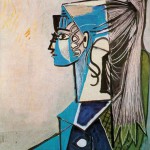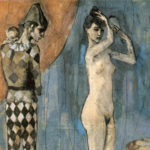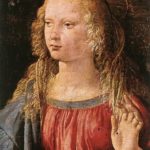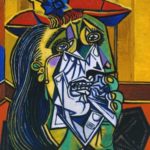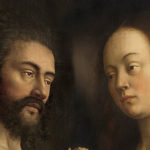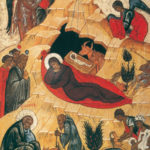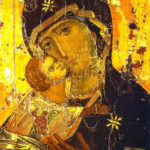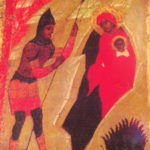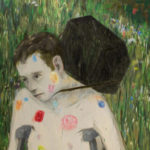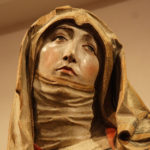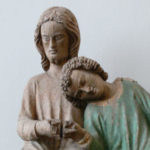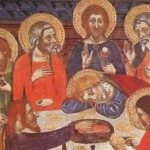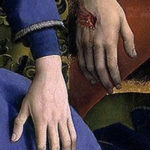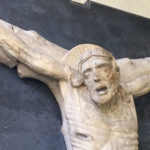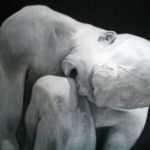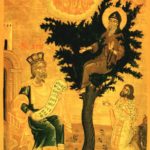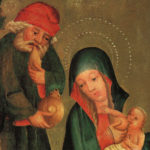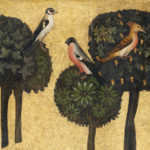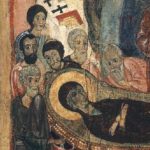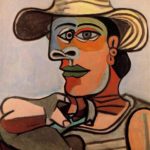The Queen of Sheba, seeking to understand the difference between prayer and magic, healing and sorcery, wisdom and superstition, found her counselors wanting and hearing of the fame of Solomon concerning his god, made a journey of one thousand miles to pose her questions to him.
She traveled with a great train of camels bearing spices, gold, and precious stones. And when she saw his forty thousand stalls of horses and twelve thousand horsemen, the meat at his table, the sitting of his servants, the attendance of his ministers and their apparel, his cupbearers and the way he ascended into the house of his god, she grew faint and offered Solomon all that she had brought, nine thousand pounds of gold and more spices than anyone had ever given the king.
When he drew her away privately, she told him all the questions in her heart. “I’ve hid nothing from you now,” she confessed, and Solomon said, “You are a seeker.”
“Give me food to eat,” she answered, and he gave her the laws of Moses.
For many days she stayed in the household of the king where she remained in her room reading and did not come out. She saw the Law as a form of love, that each situation was anticipated and provided for, a kind of Mother.
When at last she reappeared Solomon sang to her, accompanied by the harp, speaking as if he were Wisdom herself, saying, “I was there when God prepared the heavens . . . . I was by him and was daily his delight . . . .”
And the Queen asked, “Can this god be known?”
On the day of her leaving, Solomon gave her eight packets each tied with a gold thread, a song he’d written, and asked her not to read them until she reached home. I will grow in wisdom and be like Solomon, she thought. I will rule with Wisdom and I will come to know his god.
In the cool of her palanquin, she slept with the chaplets under her pillow. The days were long, the nights longer, the trip seemed without end. Borne on the shoulders of a dozen men, she wished instead to be on her own horse, racing home. In the last hundred miles she ordered that they travel at night also, men carrying torches on either side, rotating the porters. The camels, freed of their burden, ran ahead. Still, her bed, the couch and curtain, nothing seemed to move fast enough.
Before exiting the palanquin she opened the first packet. He’d written in the voice of a woman saying, “The king hath brought me into his chambers . . . my spikenard sends forth the smell thereof. A bundle of myrrh is my well-beloved unto me; he shall lie all night between my breast.” Quickly she hid the chaplet under her skirt.
She untied the second. “He brought me to the banqueting house, and his banner over me was love.” In her garden, apple trees espaliered against the thick warm walls, she read, “His left hand is under my head, and his right hand doth embrace me.” She dreamt of Solomon’s god but also of him.
In haste she opened the third packet and read, “Behold Solomon’s bed. Threescore valiant men are around it, the valiant of Israel . . . . Behold king Solomon with his crown.” And she pictured his bedroom and wanted to be there with him.
By the fourth chaplet, she realized he’d written her a love letter. There seemed to be no other way to receive his words. “Your two breasts are like two young roes that are twins, which feed among the lilies. Until the daybreak . . . I will get me to the mountain of myrrh, and to the hill of frankincense.” She stopped for breath and looked out the window at the two swans in the lake she had built. The pair seemed so happy now. “Honey and milk are under your tongue and the smell of your garments is like the smell of Lebanon.” She smelled her perfumed linen, the sachets she had rotated daily in her closets. “Blow upon my garden,” he had her ask. “Let my beloved come into his garden and eat his pleasant fruit.”
Neglecting her duties, her ministers, visitors, she neglected everything but the horizon, the lake, and the swans. I will graft myself onto you, dear Solomon, my kingdom to yours, all that I have.
Quickly she opened the fifth. “I am my beloved’s and my beloved is mine . . . . Return, return.” She called her maidservant. They laid out traveling clothes.
The seventh book she read in private, behind the drape. “I will go up to the palm tree, I will take hold of its boughs . . . Make haste, my beloved, and be thou like a roe or a young hart on the mountains of spices.”
She should send word. But, no, she would just go.
“Rise up, my love, my fair one, and come away . . . .” She would take no gifts. “The time of the singing of birds is come, and the voice of the turtle is heard in our land. The fig tree putteth forth her green figs . . . .” Just her maidservant, her cook, manservants and guardsmen. “Arise, my love, my fair one, and come away.” She rode her choice Arabians at top speed, a fresh horse every thirty miles, day and night, the mounted torchmen, across the desert in the moonlight.
They would marry, she would wear a diadem studded with topaz and bear many sons and daughters. She already saw them on the ridges of the hills where the goats played. Noble, they would be a beautiful race because they would shape their lives on the Law, all of life flourishing, covenants honored, the widow, the orphan. God would bless them as he was blessing Solomon, festooned in all his glory.
The ministers who went ahead to announce her approach returned ashen. They begged her to turn back but she refused and hastened without even bathing to the court of the king.
But Solomon did not greet her.
She returned the second day. And then the third. At last her ministers found courage to relay the news. Solomon had seven hundred wives and three hundred concubines. They were his when she had first visited, when she’d stayed in his household, when they’d spoken candidly. They were there when he’d given her the song he’d composed at their parting. Moabite women, Ammonites, Edomites, Hittites and Zidonians. He worshipped their gods, Ashtoreth and Milcom, had built temples in their honor where he burned incense and made sacrifices. When pressed, they reported he had “threescore queens and virgins without number.”
Stricken, she returned to Sheba and sequestered herself where she mourned the king and the God of Moses he’d abandoned. Mourned for herself and for what she might have become.
She thought often of Solomon, that surely at some earlier time there was a condition in which he’d been held but from which, somehow, he had fallen. She wanted to name that prior condition. The name must be beautiful like the embrace of the lovers he’d so well described, like the two swans on her lake, their purity as they glided on the water and sometimes their long necks intertwined, like Wisdom. And she called the condition in which she thought he was held when she first met him and stayed in his rooms, but from which he had fallen, taking with him only appearance, “grace.”
Sometimes she heard the reeds say, “There is a new Bridegroom,” and sometimes, “The God of Moses is yours.” But she discerned over time that it wasn’t the swans speaking and it wasn’t the reeds. It was Reason.
“The dry bough bears flower,” Reason said. “But I have no one,” she answered. “Prepare yourself so you may see the immortal Bridegroom and the Kingdom of Heaven be yours.” “But I’m not one of them.” Then Reason said, “Grace is for all, even the foreigner.”
And the queen believed these words.
The next morning she powdered her face with lavender and came from her confinement wearing a diadem of laurel leaves, singing,
She proclaimed a Jubilee so that slaves regained their freedom. She had a psalter made.
She appointed judges and gathered her people and read them the words of Moses once every year, saying,
See how your mother, Jerusalem
cries with deep emotion, saying:
Come, come to me!
Portrait of Sylvette David in green chair by WikiArt.org is in the the public domain.

